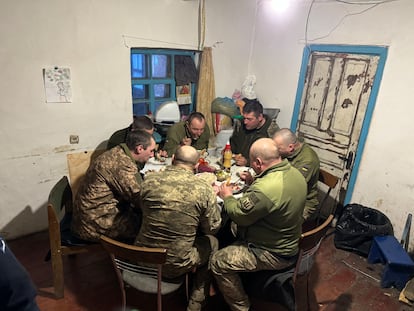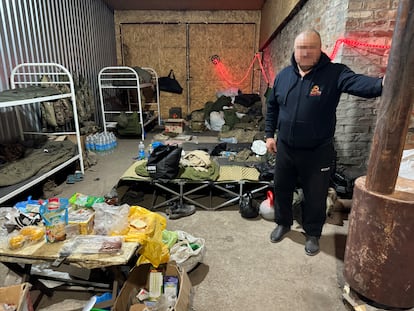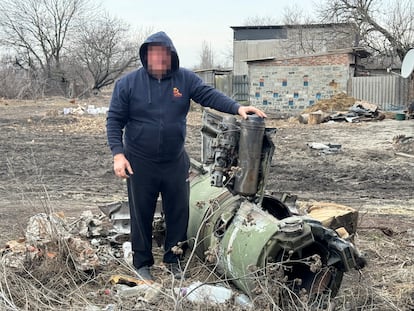A farm converted into a barracks on the Avdiivka front: ‘We need weapons and ammunition. Please hurry up!’
In an area of the front where Russian troops have gained the most ground in Ukraine, under daily bombing from the enemy, a couple of farmers shelter, care for and feed 100 soldiers

Where there used to be wheat, corn, sugar beet, or sunflower, the Russians have planted mines. On the farm managed by Roman on the side of the road from Pokrovsk to Ocheretyne, six miles to the east and on the Donbas frontline, guided bombs of up to 500 kilos, cluster munitions, artillery fire of different calibers and even Tochka-U type missiles — capable of hitting a target at a range of up to 75 miles and with a warhead of up to 450 kilos of explosives — are constantly falling. Since February 17, when Ukrainian forces withdrew from Avdiivka, 16 miles away, Russian aviation has not stopped bombing the area in an attempt to pave the way for its infantry which, only a few miles further back, has advanced over the last few days. “Is it that in Europe they don’t see it?” asks the 58-year-old farmer, who refuses to abandon the land of his ancestors despite the siege. “We need weapons and ammunition. Please hurry up!”
In recent days, Ukraine has managed to contain Russia on this part of the front which, since the withdrawal from Avdiivka — a suburb of the city of Donetsk, the Russian stronghold in occupied Ukraine — had been under heavy pressure. Kyiv’s new defensive strategy — handing the enemy the initiative and concentrating on defending its positions — was not bearing fruit. The Kremlin’s guided bombs were wreaking havoc in the rear, forcing its soldiers to retreat, but in recent days artillery units have received the ammunition and rockets that had been in short supply for months and have managed to slow down the invading troops. However, “the orcs” — as the Ukrainians call the Russians in reference to the bad guys in J.R.R. Tolkien’s Lord of the Rings trilogy — have not stopped attacking in what they describe as “a battle of flesh.” Those who fall are replaced by others, and those who fall next are replaced by more. “That’s their advantage,” say soldiers from the 47th Ukrainian Brigade stationed in this area. “They send their men in without caring how many they might lose.”

This flashpoint on the front has once again brought the war to Roman’s doorstep, which he has refused to leave since the Donbas conflict broke out in 2014. “Look what I found this morning,” he says as he uncovers the dump truck parked next to his house. Inside are the wings, rear flaps, and nose of a Russian guided bomb that, fortunately, did not explode. In the same vehicle, he tours his fields to show how the war has affected his farm.
Dozens of Ukrainian tanks and armored vehicles hide camouflaged in narrow, elongated rows of trees surrounding vast expanses of crops, but the farmer, without apparent fear, goes into the open fields where one feels small and exposed. A perfect target for the invader. As he points out a crater caused by a bomb, a fighter plane roars overhead. Minutes later, a huge explosion is heard. A shell has landed barely 300 yards away. Nearby, a group of workers with yellow bulldozers dig hundreds of meters of trenches to head off a possible offensive.
“Just yesterday I sent 75 pigs to a farm in Dnipro,” Roman says as he points to his herd, where the remaining animals remain under a precarious roof punctured by impacts. “If the Russians kill them, I want to keep some to start over,” he says. Next to the shed, Roman opens the door to the little house where he keeps the tools and feed for the animals, but its contents are different today. The building has been transformed into a dormitory for soldiers with dozens of bunk beds strewn on the floor with sleeping bags, clotheslines, and a huge mess of leftover food, cigarette packs, rifles, and khaki-colored clothes. In the center, a wood-burning stove heats the large room. Each of the sheds on his farm, where machinery was once kept or grain stored, now serves to accommodate combatants, when they are not in their positions or in the trenches. In all, about 100 men conceal themselves from the enemy in every corner of his land.
The food is ready. On the kitchen table, two of the female employees working in this barracks farm arrange a dish of salo — traditional Ukrainian salted bacon — with garlic and onions and another with slices of fried fish caught in the surrounding lakes. Also three other huge platters with seasoned lard to spread on bread, potato salad, and another one based on beet. While the soldiers, who eat in shifts, begin to nibble, the women prepare a dish based on pasta with pork giblets that the men gobble up as if there were no tomorrow. They drink uvar, a cold infusion made of water, sugar, and different fruits and herbs. They also wash their clothes when they need to. “All these kids have now become our children,” says Roman. “They lead a very hard life at the front and we try to make sure they rest well here and have everything they need.”

Prepared to pack up
In the rooms that Roman and his wife Yulia occupy, everything is provisional. The suitcases are packed and their most valuable belongings are ready in case they have to leave in a hurry. Some of their things have already been sent to safer places. The little time the soldiers leave them is spent bottling food — tomato sauce, vegetables, pork stew — in large jars that they store on shelves under a trap door with jars of oil and other non-perishable products in the air-raid shelter they have built in the basement. Their two daughters, one an 18-year-old student and the other, 31, married to an army instructor, are safe in the town of Dnipro, 150 miles to the west, where the war barely reaches. “For us that’s the most important thing, that the girls are safe while we are still here,” Roman assures his wife.
Yulia, with misty eyes, says that they call them every day asking them to get the hell out of there. It makes no sense to be in danger. That the Russians might come and get them. But this strong-looking woman soon pulls herself together. “We live well here. We like to be with the soldiers and feed them homemade food every day so they feel at home. We are very grateful to them because they are fighting for us and what we want is to help them with everything we have,” she says. “We know perfectly well the danger we are in, but we are prepared in case [the Russians] come close. Just today we heard airplanes and there have been several explosions, but so what? Here we take care of the kids and we are in our home. Are we going to leave all this abandoned? No, for now, we are not going to leave.”
After two years of heavy fighting, the life of the servicemen on the Avdiivka front is very precarious. Despite risking their lives every day for their country, those who are not lucky enough to be with people like Yulia and Roman have to rent their own accommodation, paid for with their salaries, if they do not want to live permanently in the trenches. The Starlink antennas provided by the army are now in short supply, and they have to pay for their own telephone and internet access. What little food they are provided with they supplement from their budget and cook for themselves. Even getting a new uniform is a pipe dream when the ones they have are worn out.
Sitting at his kitchen table, Roman, looking tired, rubs his face and head with his hands and reflects aloud. “We have to win this war, we can’t leave this problem to our children and grandchildren,” he says. “If our allies don’t want to send us soldiers, let them at least give us the weapons and ammunition we need to keep fighting, but let them hurry,” he continues. “If they don’t, sooner or later they will be the ones who will have to fight the Russians on the battlefield.” Meanwhile, Yulia covers the last glass jars with food fresh from the oven. Tomorrow it will be back to feeding the pigs, tending the crops, fetching firewood, and preparing food for the soldiers. Protecting and caring for their farm. Defending their homeland.
Sign up for our weekly newsletter to get more English-language news coverage from EL PAÍS USA Edition
Tu suscripción se está usando en otro dispositivo
¿Quieres añadir otro usuario a tu suscripción?
Si continúas leyendo en este dispositivo, no se podrá leer en el otro.
FlechaTu suscripción se está usando en otro dispositivo y solo puedes acceder a EL PAÍS desde un dispositivo a la vez.
Si quieres compartir tu cuenta, cambia tu suscripción a la modalidad Premium, así podrás añadir otro usuario. Cada uno accederá con su propia cuenta de email, lo que os permitirá personalizar vuestra experiencia en EL PAÍS.
¿Tienes una suscripción de empresa? Accede aquí para contratar más cuentas.
En el caso de no saber quién está usando tu cuenta, te recomendamos cambiar tu contraseña aquí.
Si decides continuar compartiendo tu cuenta, este mensaje se mostrará en tu dispositivo y en el de la otra persona que está usando tu cuenta de forma indefinida, afectando a tu experiencia de lectura. Puedes consultar aquí los términos y condiciones de la suscripción digital.








































